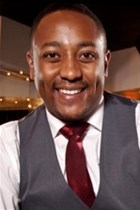Optimism in an age of AI by Musa Kalenga
As a South African entrepreneur working on bringing a new artificial intelligence invention to market in this country, I've witnessed firsthand how this technology positively transforms the experience of life.
I believe AI will be a force for good for our economy. This is despite the pessimistic and apocalyptic view that some of the richest, and smartest people on this planet have of AI.
The late Stephen Hawking made it well known that thinking AI machines would subjugate humanity. “The development of full artificial intelligence could spell the end of the human race," Hawking told BBC News before he passed. In Wired Magazine he was quoted as saying: "I fear that AI may replace humans altogether. If people design computer viruses, someone will design AI that improves and replicates itself. This will be a new form of life that outperforms humans."
Controversial South African-born billionaire, Elon Musk, similarly expressed grave concerns about AI's potential dangers. His fearful statements paint a dystopian picture reminiscent of science fiction blockbusters - a world where intelligent machines decide humanity is more trouble than it's worth. In an interview with Bloomberg years ago, Musk, the controversial owner of X, likened building AI to “summoning the demon”.
Unlike Musk or Hawking, but much like the inventor and futurist Ray Kurzweil I believe that AI will improve the world. Kurzweil thinks the benefit of AI will eclipse any of its adverse effects. “We have a moral imperative to realise this promise while controlling the peril. It won’t be the first time we’ve succeeded in doing this,” Kurzweil told Time Magazine.
This is already happening. AI-powered smart assistants like Alexa or Siri respond to human voices to improve planning, and productivity or perform searches and manage devices at home or work. They can even elevate our moods with jokes or puns.
Spam filters driven by algorithms and AI determine what emails are spam, a security threat or legitimate communication and help us by routing and sorting these so we don’t have to.
ICT giants like Apple, Microsoft, Twitter, Intel, Salesforce and Apple are investing heavily in AI technology. AI adoption in companies, says McKinsey, has now reached some 72%.
Meanwhile, big technology companies like Apple, Meta, Microsoft, Google and Amazon are “gobbling up” AI startups. The acquired tech is being engineered into products and services, like Google’s smart speakers or Amazon’s product listings.
In the financial sector, AI is democratising access to investment advice with robo-advisors that offer personalised financial planning to people who were historically excluded from getting this kind of service.
One of my favourite local stories is that of Botlhale AI, an inventive technology company born of the belief that language should never hinder access to digital services. The problem with access to most Natural Language Processing tools is that to date they’ve predominantly catered to English speakers.
Botlhale AI, which was recently featured on CNN, is disrupting this by extending access to African languages. “We aim to empower speakers of African languages to enjoy the conveniences and innovations these systems bring to their daily lives,” the inventors at Bothale AI say.
Another local startup I love is Zindi, the first data science competition platform in Africa to host an entire data science ecosystem of scientists, engineers, businesses and institutions focused on solving Africa’s most pressing problems. Importantly, Zindi is a place where technologists and businesses can access African datasets and use these to solve African problems.
One of the sectors where AI could do significant good is Education. Our education system faces massive challenges like unequal quality education, resource constraints, skills mismatches and classrooms that are way too overcrowded. Here AI-powered learning assistants could supplement learning or even open access to personalised tutoring that adapts to each student's unique pace and learning style.
I firmly believe that AI won’t replace humans in the workplace but that with AI-driven decision support new jobs and pathways to economic participation can be creative. In this way, the technology could be transformative to our country which is grappling with such high unemployment rates.
Yes, we need to enable ethics and develop with care. We need to be mindful of bias and build systems developed with diversity for the broadest mass of our population in mind.
Importantly, we must build the infrastructure and skills base necessary to fully realise AI's full potential across all sectors of our society. As an entrepreneur deeply involved in AI, I have become increasingly more optimistic about our future. This country has a history of using technology to leapfrog development. Look at how mobile technology changes our world.
AI is our moonshot. It is a dream and an optimism we’d do well to embrace to turn this country around economically and socially for the greater good.
Musa Kalenga is a technologist, speaker, entrepreneur, author of The Brave Code, and Ladders and Trampolines. He is the Group CEO of The Brave Group, inventors of FORGE by Brave, a new AI-driven solution that supercharges marketing by enabling unprecedented speed, efficiency, and success.

- AI: A leapfrog opportunity for South African economic growth06 Dec 10:56
- AI: The great creative equaliser28 Nov 11:59
- Bravado uses AI to supercharge Nedbank’s brand19 Nov 11:28
- Optimism in an age of AI by Musa Kalenga01 Nov 11:09
- Forge By Brave built to democratise marketing22 Oct 10:14
Related
Warc: News media struggles as brands favour softer content 1 day Social media rebrands: The failure - X, the insipid - Meta and the success - Instagram 2 days TDMC HQ’s 8 key digital marketing insights from the past year 9 Apr 2025 Marketing budgets: A catalyst for ESG transformation 3 Apr 2025 Trump's trade war: US slaps 30% tariff on South African imports 3 Apr 2025 Exclusive | Gmail’s AI Search: Game-changer or a privacy nightmare? 2 Apr 2025
























